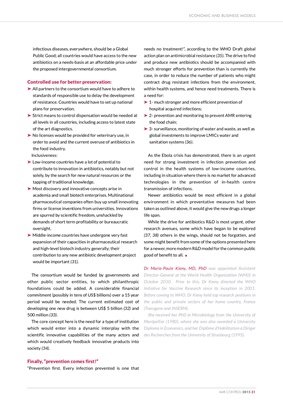
infectious diseases, everywhere, should be a Global
Public Good; all countries would have access to the new
antibiotics on a needs-basis at an affordable price under
the proposed intergovernmental consortium.
Controlled use for better preservation:
‰ All partners to the consortium would have to adhere to
standards of responsible use to delay the development
of resistance. Countries would have to set up national
plans for preservation.
‰ Strict means to control dispensation would be needed at
all levels in all countries, including access to latest state
of the art diagnostics.
‰ No licenses would be provided for veterinary use, in
order to avoid and the current overuse of antibiotics in
the food industry.
Inclusiveness:
‰ Low-income countries have a lot of potential to
contribute to innovation in antibiotics, notably but not
solely, by the search for new natural resources or the
tapping of traditional knowledge.
‰ Most discovery and innovative concepts arise in
academia and small biotech enterprises. Multinational
pharmaceutical companies often buy up small innovating
firms or license inventions from universities. Innovations
are spurred by scientific freedom, unshackled by
demands of short term profitability or bureaucratic
oversight.
‰ Middle-income countries have undergone very fast
expansion of their capacities in pharmaceutical research
and high-level biotech industry generally; their
contribution to any new antibiotic development project
would be important (31).
The consortium would be funded by governments and
other public sector entities, to which philanthropic
foundations could be added. A considerable financial
commitment (possibly in tens of US$ billions) over a 15 year
period would be needed. The current estimated cost of
developing one new drug is between US$ 5 billion (32) and
500 million (33).
The core concept here is the need for a type of institution
which would enter into a dynamic interplay with the
scientific innovative capabilities of the many actors and
which would creatively feedback innovative products into
society (34).
Finally, "prevention comes first!"
"Prevention first. Every infection prevented is one that
needs no treatment!", according to the WHO Draft global
action plan on antimicrobial resistance (35). The drive to find
and produce new antibiotics should be accompanied with
much stronger efforts for prevention than is currently the
case, in order to reduce the number of patients who might
contract drug resistant infections from the environment,
within health systems, and hence need treatments. There is
a need for:
‰ 1- much stronger and more efficient prevention of
hospital acquired infections;
‰ 2- prevention and monitoring to prevent AMR entering
the food chain;
‰ 3- surveillance, monitoring of water and waste, as well as
global investments to improve LMICs water and
sanitation systems (36).
As the Ebola crisis has demonstrated, there is an urgent
need for strong investment in infection prevention and
control in the health systems of low-income countries,
including in situation where there is no market for advanced
technologies in the prevention of in-health centre
transmission of infections.
Newer antibiotics would be most efficient in a global
environment in which preventative measures had been
taken as outlined above, it would give the new drugs a longer
life span.
While the drive for antibiotics R&D is most urgent, other
research avenues, some which have began to be explored
(37, 38) others in the wings, should not be forgotten, and
some might benefit from some of the options presented here
for a newer, more modern R&D model for the common public
good of benefit to all. l
Dr Marie-Paule Kieny, MD, PhD was appointed Assistant
Director-General at the World Health Organization (WHO) in
October 2010. Prior to this, Dr Kieny directed the WHO
Initiative for Vaccine Research since its inception in 2001.
Before coming to WHO, Dr Kieny held top research positions in
the public and private sectors of her home country, France
(Transgene and INSERM).
She received her PhD in Microbiology from the University of
Montpellier (1980), where she was also awarded a University
Diploma in Economics, and her Diplôme d'Habilitation à Diriger
des Recherches from the University of Strasbourg (1995).
ECONOMIC AND BUSINESS MODELS
AMR CONTROL 2015 31